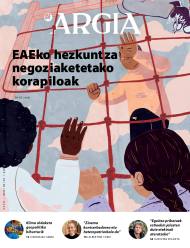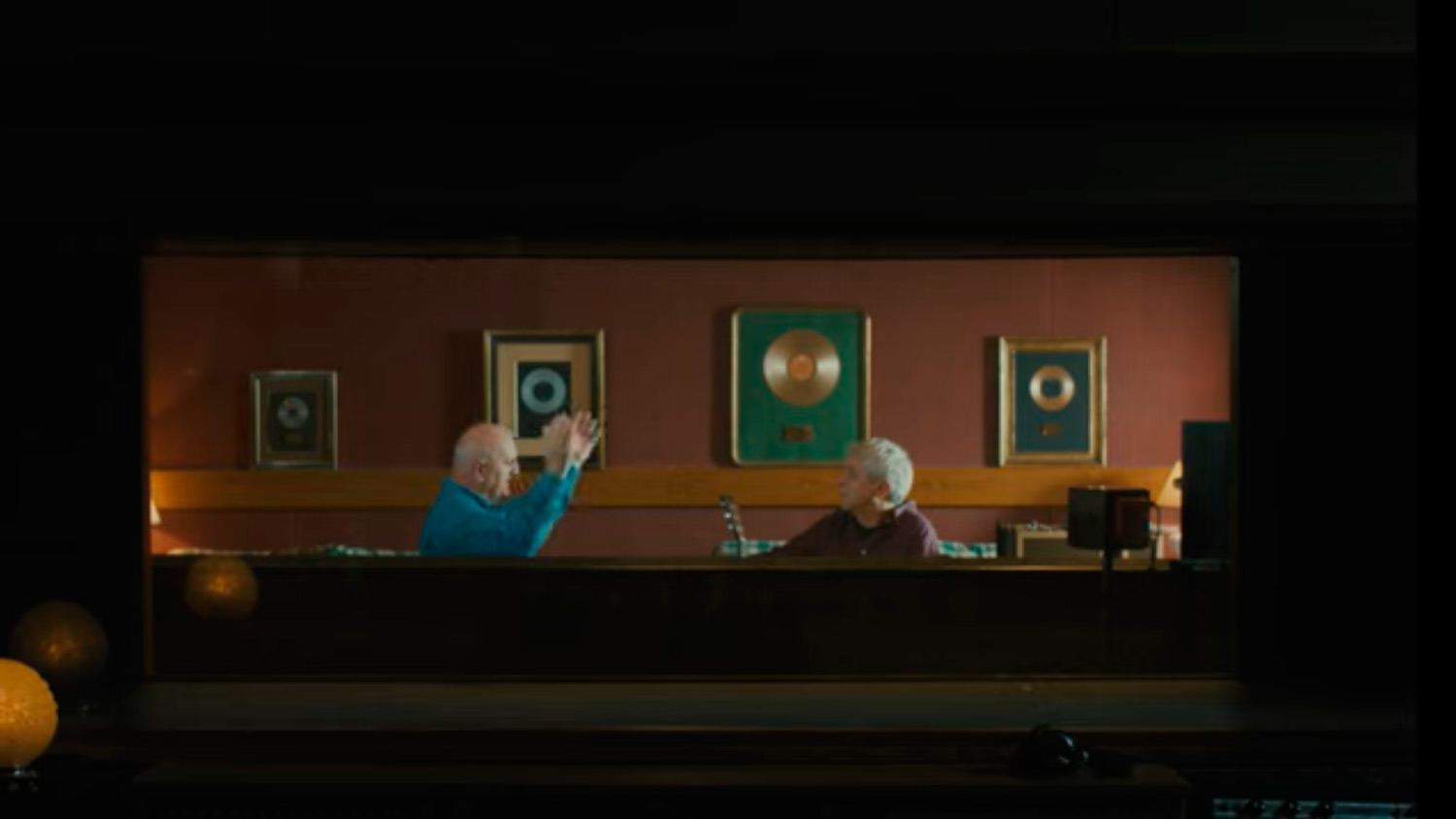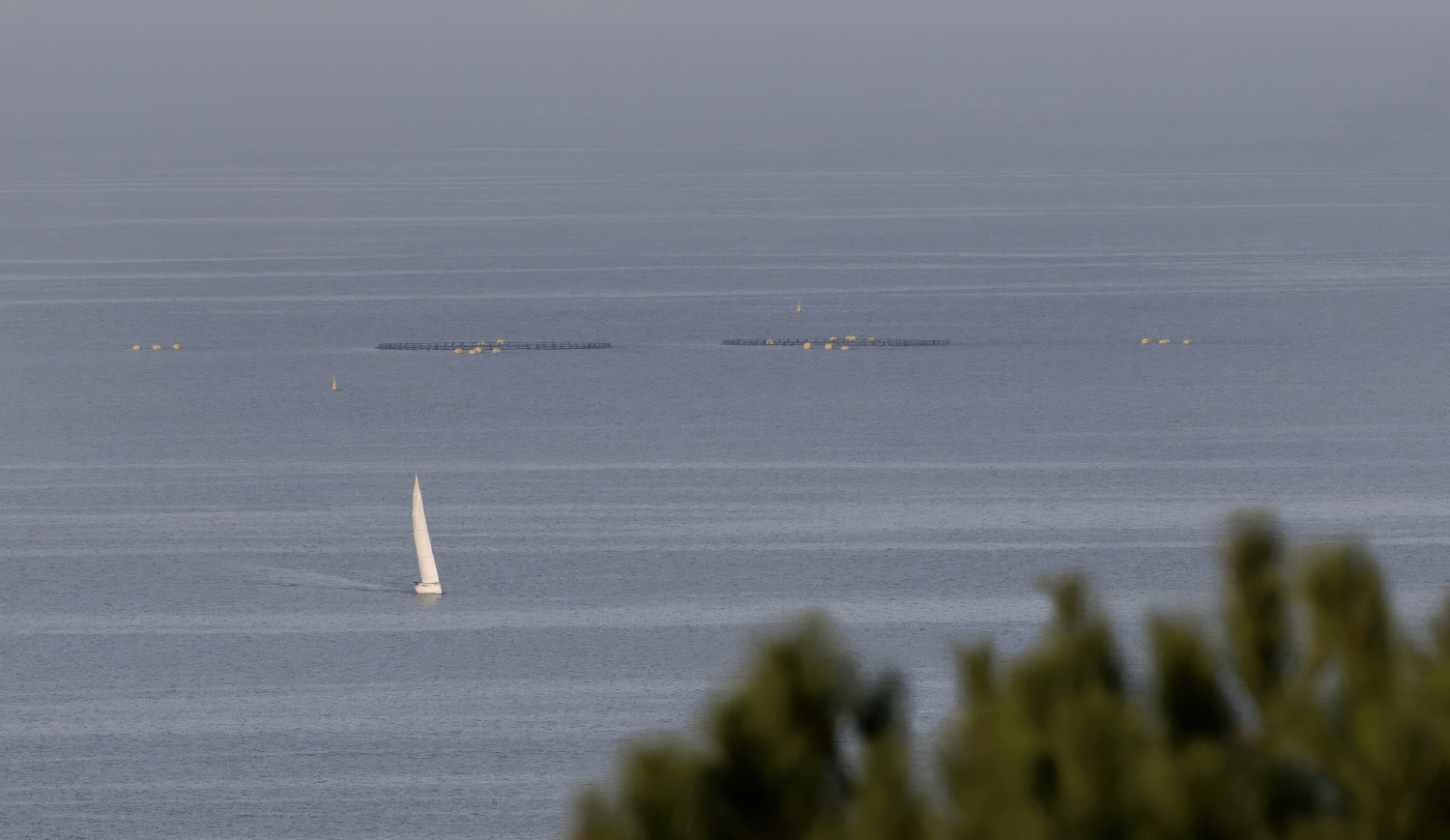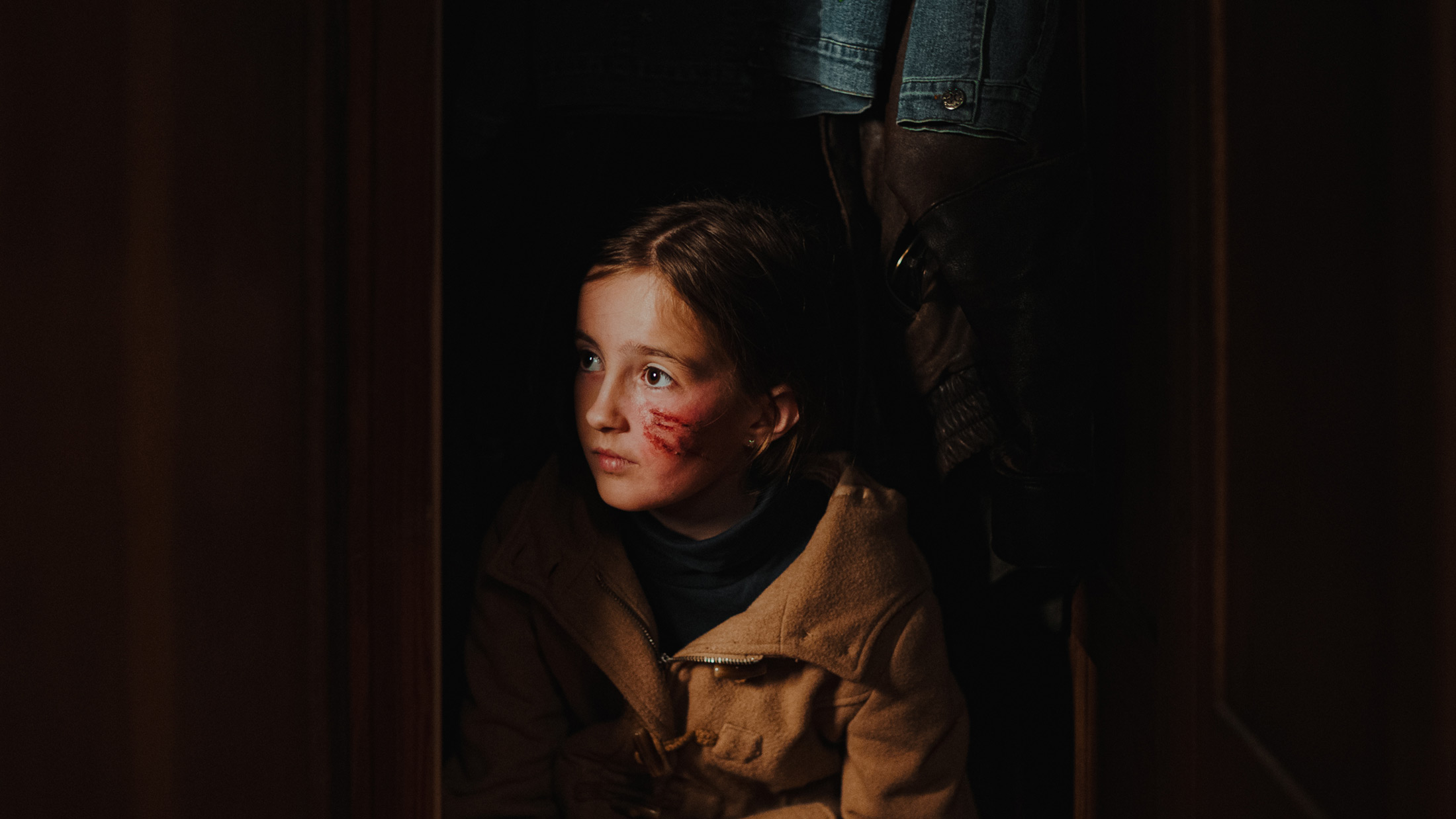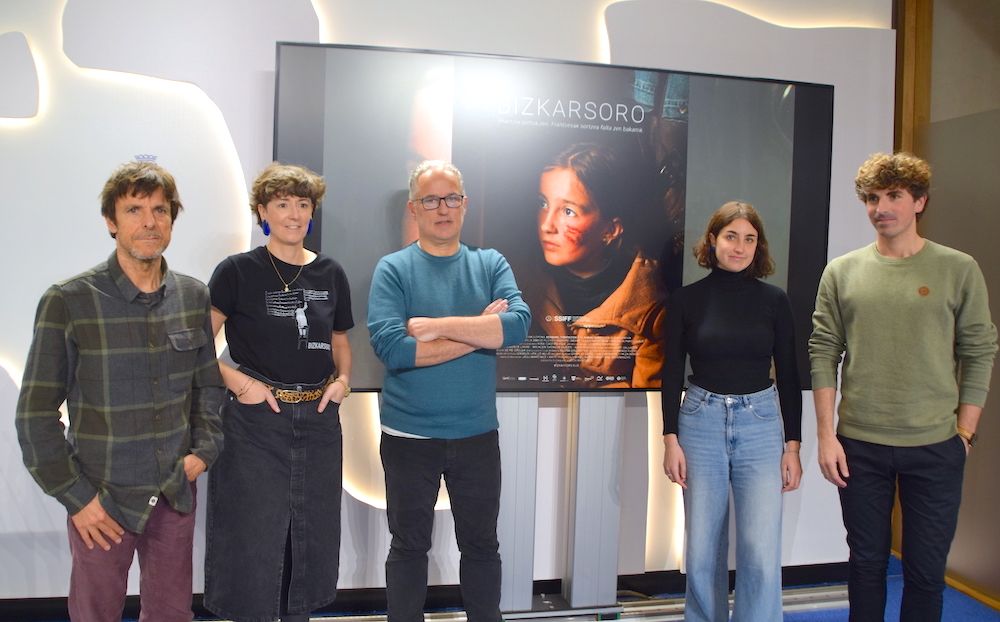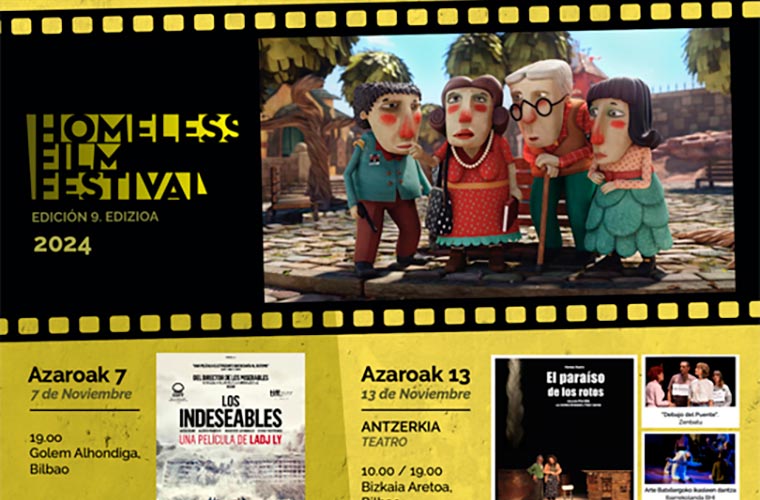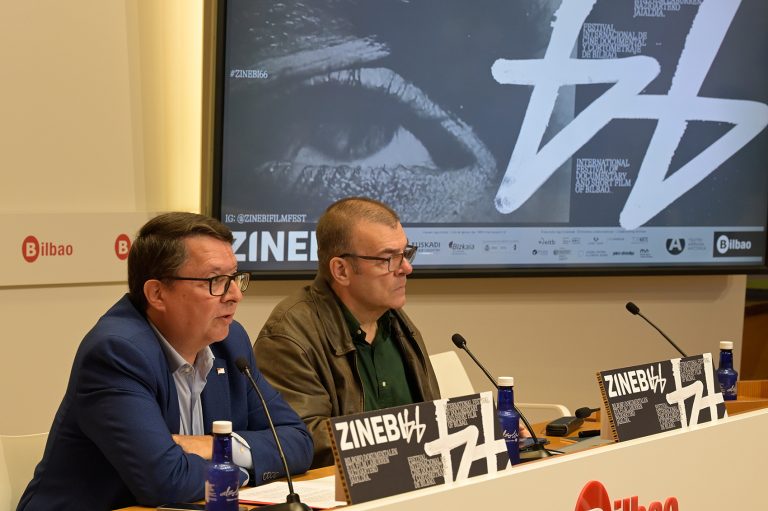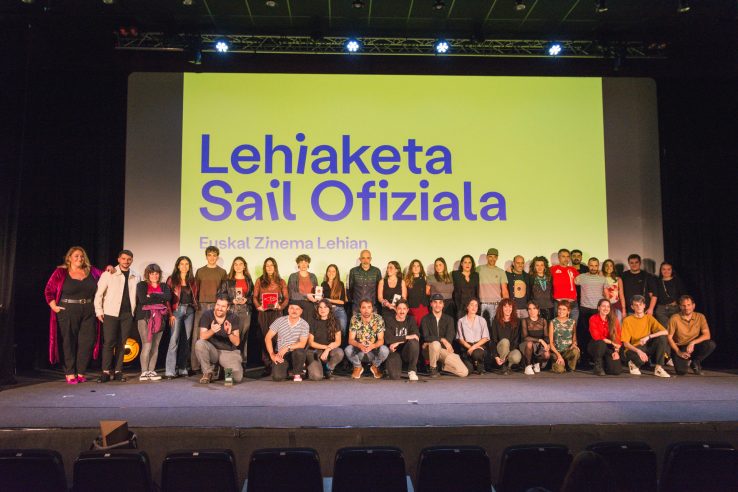"The camera is also a mode of writing."
- Bilbao, 1 March 2022. The Argentinian filmmaker Albertina Carri was tired but pleased with her appointment at the hotel’s atrium. “They have been very intense days. It looks like I live here two months ago, but no, I've just arrived and I'm leaving again." The day before he received the Zinegoak Festival Honor Award, recognition of his career as film director. An ideal watchtower to review the harvest of the last two decades.
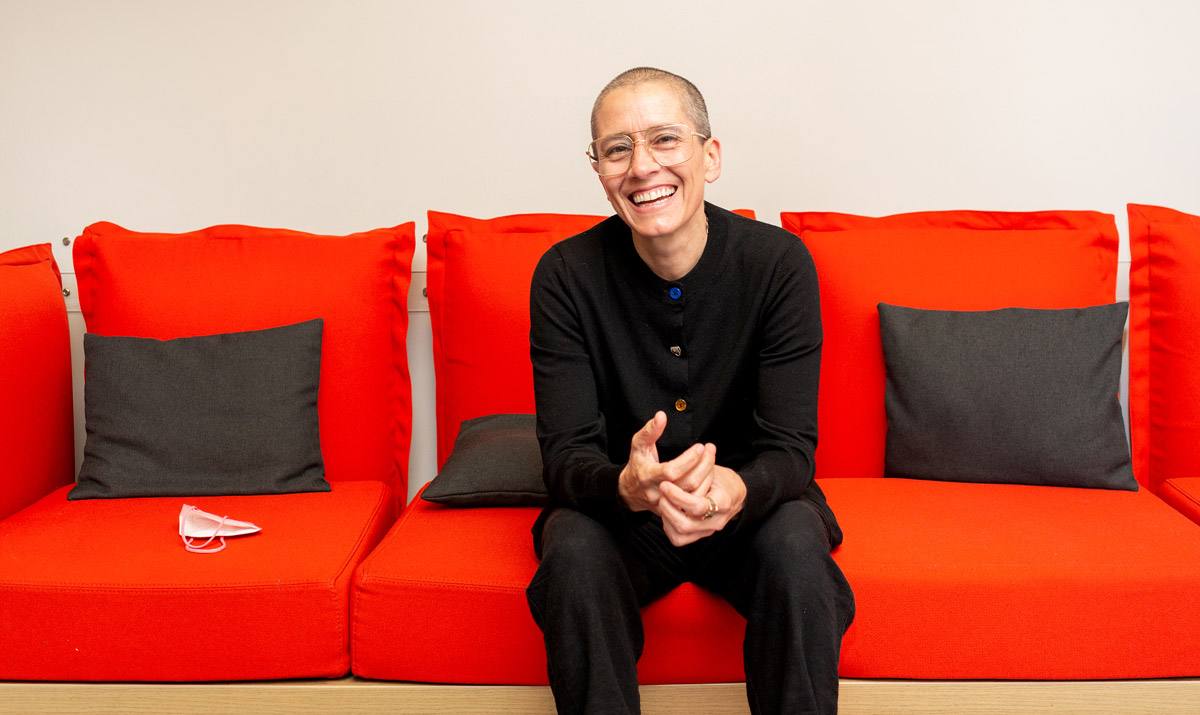
Zinemagilea. 2000. urtean kaleratu zuen bere lehen film luzea, eta orduz geroztik dozena bat lan egin ditu, era askotakoak. Auzi sozial eta politikoek presentzia handia dute bere lanetan: 4 urte zituela, haren gurasoak desagerrarazi zituen Argentinako azken diktadura militarrak. Kasu hori landu du bi dokumentaletan: Los rubios (2003) eta Cuatreros (2017). Feminismoak eta sexu-askapenaren borrokak ere garrantzia izan dute bere ibilbidean; horren erakusgarri, bere azken film luzea, Las hijas del fuego, zeinak lesbianen eta genero ez-bitarreko pertsonen sexualitatea eta gozamena erakusten baititu, garden eta eder.
Why did you choose to study film?
I've always been curious about writing, and I decided to study film because I wanted to learn how to write in a different format. I mean, I really wanted to be a writer and not a director. Then I started working in a camera group. My theory is that, although I now find it a little solemn, at that point I discovered that the camera is also a form of writing. But I wasn't very cinéphilous, like other faculty members, my background was more related to literature.
Since just over 20 years ago you started making films, what has changed in that time?I learned to record in 35 millimeters
and when it came time to make films the format disappeared! So now I know how to do a lot of things that don't work at all [laughter]. Putting aside the jokes, the technological changes have been huge, and I'm sure they've also changed the kind of narrative. The same with distribution: platforms have been created, cinemas have disappeared and the story has changed after all this.
Today it seems that everything is on audiovisual platforms, but it's not true. For example, watching your movies online is very difficult.
It is precisely the platforms that have implemented an idea that everything is visible, it seems that everything can be found and everything can be seen. Well, a little older film isn't easily found. That is why film festivals are necessary, not only for works of the past, but also for this more or less independent film.
The Zinegoak festival is a clear example of this.
In addition, these kinds of festivals sort of regain a little bit of the experience of film, right? You're going to watch movies, and you've talked to people about film, which was once the norm. When I started studying, I studied more at small festivals than I did at school. Debate, circulation of information, heat and passion, I believe that all this is still very much needed.
Have you struggled so hard to make your own movies as you want?
Yes, and somehow I've paid the price: many of my films have very low budgets. These are films made with human resources, rather than with capital resource. Resource capitals have narrative demands, and I wasn't willing to do that.
Within the arts, I think film is very conservative and heteropatriarchal, of course. It is difficult for film to reach situations that are happening in reality. Music, theatre, performance and these much more radical artistic manifestations deal, much earlier than cinema, with certain social temperatures.
You talk about film and the heteropatriarchate, what do you think of distinguishing between author and work?I find it very
difficult to do this. I grew up with Polanski's film, I found it interesting and I liked it; then, when I heard about the things he did, I can't defend his work. The question would be another: What do we do with gratuitousness in society? Well, we say it, we count it. It's part of the memory, it shows where we came from. But distinguish between author and work… no. Just as Polanski didn't distinguish a very bad childhood, he did terrible things, unlikely things. Then everyone will decide if they want to watch their films. I haven't seen them for a long time.
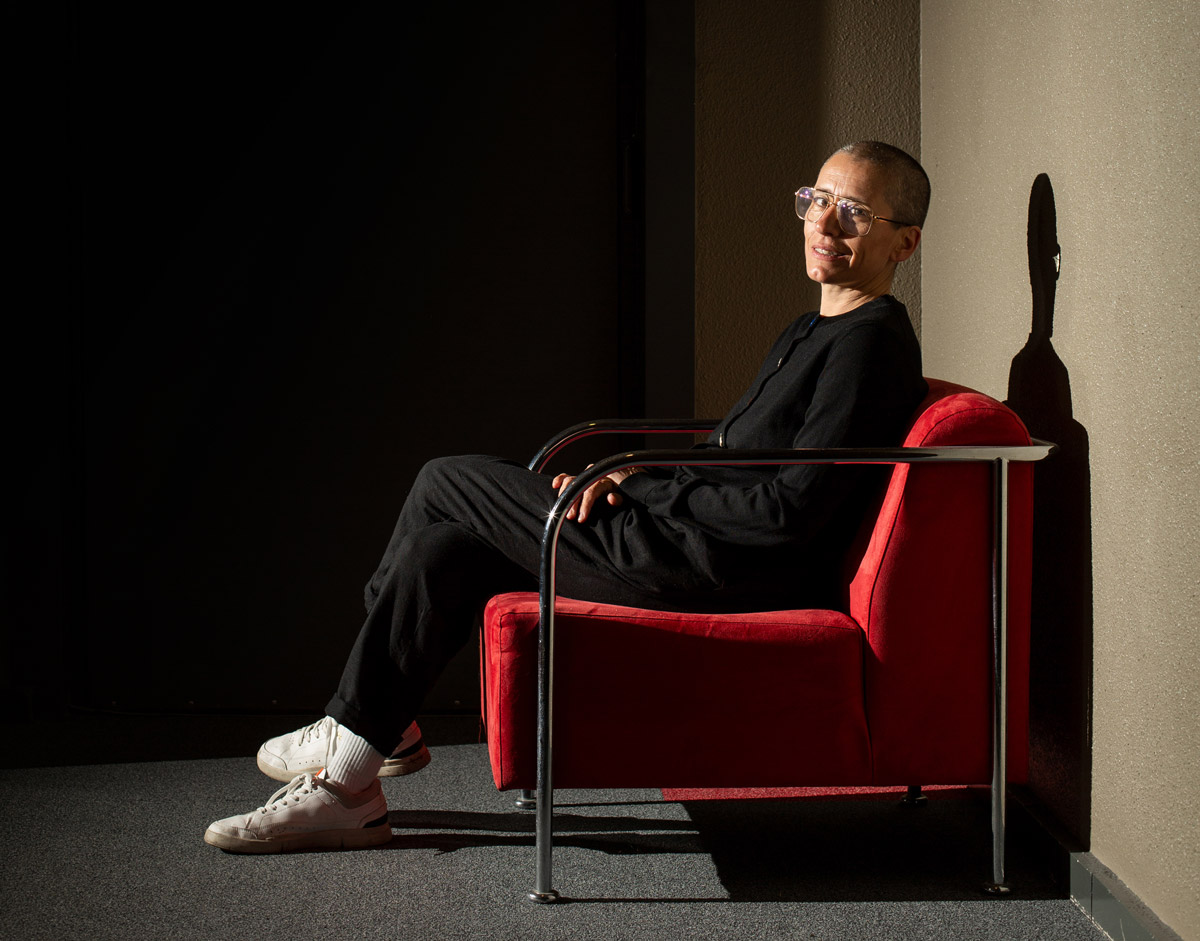
"That cinema is an absolutely conservative space, that has to do with production systems: cinema is very schematic as to how to do it"
Last year he published his first novel: Beasts ikasi nion. Has the pandemic had anything to do with it?
Everyone thinks it has something to do with the pandemic, good! I wish I could write a book in a lockdown of eight months. But no, it had been a long time with this project. Then I got two movies [Cuatreros and Daughters of the Fire], and I put it aside until I decided that I would end for better or for worse. In Pandemia, the truth is that I've worked with another book: an essay will come out on the street this year.
I met you thanks to the film The Daughters of Fire (2018). It was not the first time he cultivated the pornographic genre: Barbie may also be sad (2001).
Yes, Barbie was totally pornographic, but with dolls. I was curious about gender, because it has a prominent place in the world of film. I think I'm repeating the same thing over and over again, but I'm going to say, all the cinematographies of the world started with pornographic images. Now, of course, my search is different, but when 20 years ago I started looking at the pornographic genre, I felt a certain intrigue about that strictly didactic genre, which looks for a type of voice and sexuality, and also a form of domination, because in pornography you see clearly that images create reality and dominate it.
It's a controversial issue within feminist movements.
There was a great interest in prohibitionism. I am not in favour of banning in general, I believe that we need to learn how to regulate ourselves.
At the San Sebastian Film Festival I saw The Daughters of Fire, which shows explicitly and joyfully the sexual diversity of LGTBQ+ people. Despite being a delicious film, it generated great discomfort in the room.
Yeah, it's really fun to watch that movie in a room. In San Sebastian, some spectators came out of the movies and told us the most terrible thing. It is a very Catholic city and the public is of great importance at the festival. I remember a lady was very angry saying that they had not been told it was porn, in that case the responsibility of the organization. I understand that it can be a shock to come across that film without anyone telling you.
However, the film has had considerable success.
When we were recording our fantasy, it was premiering it in porn theaters and being there continuously. We didn't think it would make that path, we thought it would be much more underground. And there we became mainstream, by a calculus accident! [laughter]. Well, not so much, but the movie has had a huge impact, very big traffic, and it's a great thing, because people saw it.
On the other hand, I think my previous trajectory was important, it was also important for the girls who worked on the film. If a totally unknown person had made this film, they would have punished a little more. I've been bothering for a long time, over 20 years.
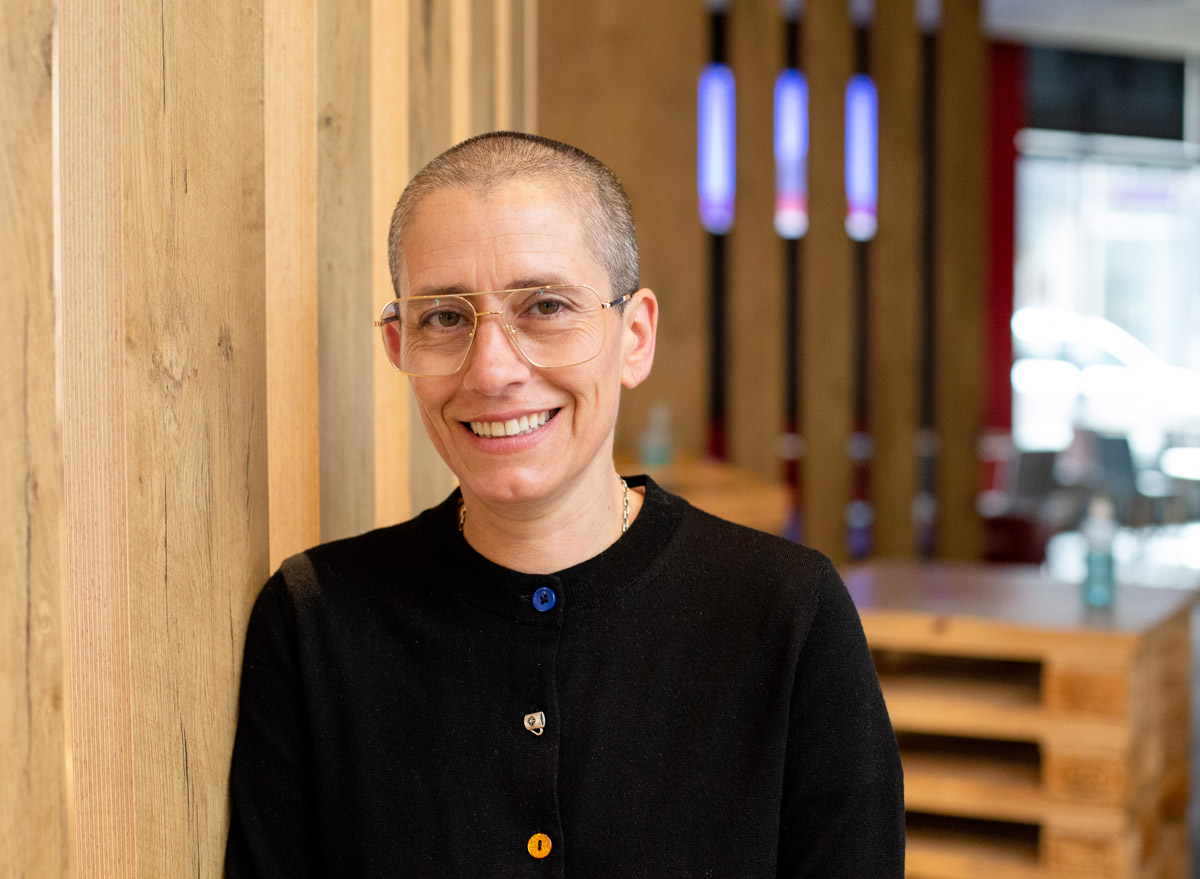
"I grew up with Polanski's film, I found it interesting and I liked it; then, when I heard about the things he did, I can't defend his work"
In addition to explicit sex scenes, the discourse occupies a prominent place in the peekcula.Otras dimensions
of eroticity seemed interesting to me: the word, the narrative aspect, the work on landscapes. In line with the idea of the deconstruction of the pornographic genre, as each character has his own joy or search in the script, I thought that other instances also had to be worked out. So there's a poem, for example.
The recording process was unusual.
Since I made Barbie, making a human movie was a post-era fantasy, but it seemed to me that I was going to repeat the mistake of the genre itself, that is, that casting was going to be necessarily abusive, that it would be abusive to call women to come represent and do certain things. In that sense, I made the film the moment you could do it. I met Rocío Castelli, an anthropologist and feminist and lesbian activist, who was responsible for casting, and there was this group of women who participated in the film, who came to make the film with a militant conviction. They are all actors, but above all they are activists and they have other jobs: anthropologists, lawyers… They are serious people, not like me, I make movies [laughter].
Should we invest not only the content and the form, but also the way to do so?
I told you earlier that cinema is an absolutely conservative space, because that has to do with production systems: cinema is very schematic as to how it is done, and I believe that breaking those structures is more complex and more difficult, it takes longer. But things can be done differently, with the costs involved, as always.
In this sense, we create a team and a structure for The Daughters of Fire, not only in terms of casting, but also in terms of production and technical equipment, if any, and we work differently, much more horizontal. A community was formed, and I think that's noted in the movie. The narrative is another, it is really a deconstruction of the pornographic genre, but in order to tell it another form of production had to be made possible behind the camera.
If I'm not mistaken, you'll start recording your next movie in the fall.
They say so.
I don’t know if you can
anticipate… Let the white roses fall, which will largely be the groups and actors of The Daughters of the Fire. Road is also a movie, but now we go from Buenos Aires to Sao Paulo. Let's go north, to the heat.
Because at the beginning of The Daughters of Fire…
The Daughters of Fire started at the end of the world! [laughter]. For me, it was interesting to tell another Argentina that is not generally counted. Argentina seems to be Buenos Aires, and Buenos Aires is very different from other places in the country.
This new film is a continuation of The Daughters of Fire, but they have nothing in common. It will allow us to delve into some of the issues that appeared in the first film. We will continue to work on this issue of territory, landscape and bodies. But I won't say anything else. Maybe you find some synopsis there or here, I never know what is said.
I read an article on the financing of the film.
Yes, there will be a co-production with Brazil and a producer here, from Euskal Herria, Doxa. In that sense, the film is a little bigger, but I think it maintains that libertarian and celebratory state of the previous one, and after all this is the most important thing, I think we have to go there.
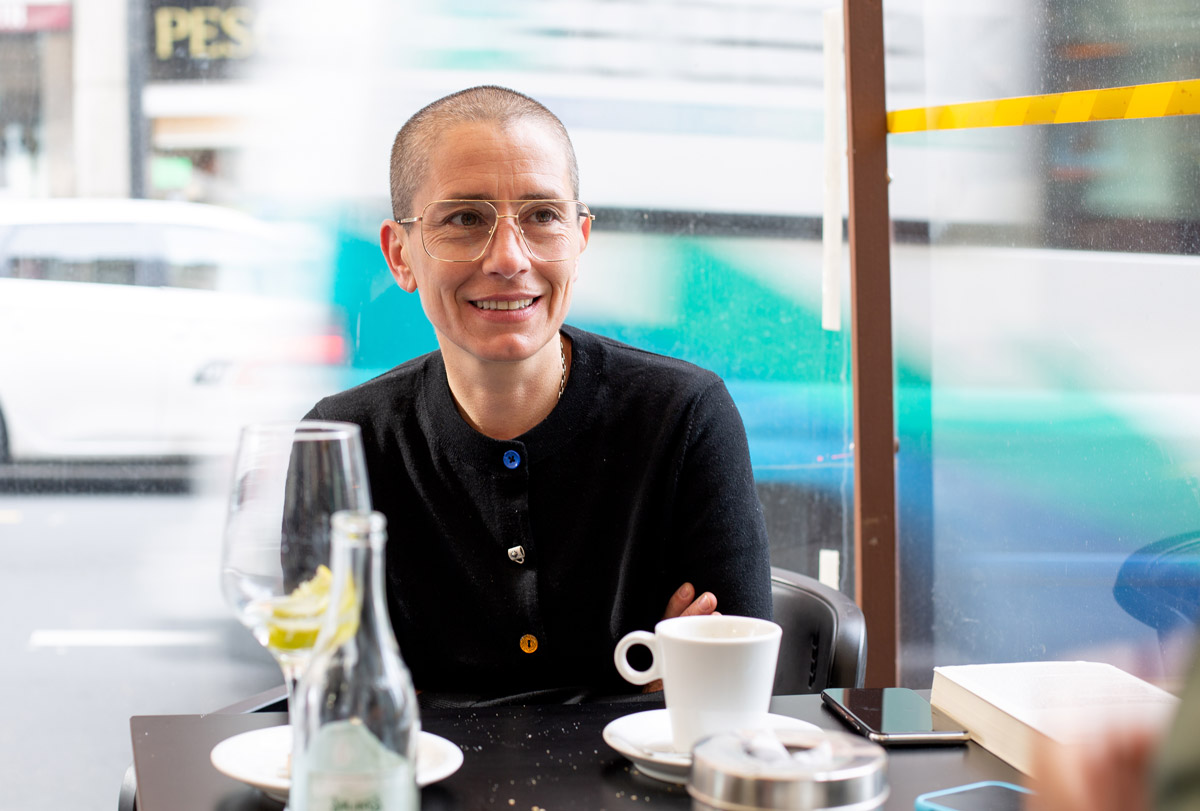
"Collective memory is very important, but also the staff is there, and I'm becoming increasingly clear that we have the right to forget ourselves and that forgetfulness is necessary to live."
You mentioned earlier that this year you are going to publish a trial. What is it about?
It is a joint project with an Argentine philosopher: It's called Esther Díaz, and I think it's a very interesting thinker. Before the pandemic we launched an exchange of letters on the specific topic of memory. Then the project stopped and when we started again the issue of losses.
Although we have barely mentioned in this interview, the historical and political memory of Argentina has been very important in your work. Does the essay follow this path?
We just started writing about Memory Day. March 24, the date of the beginning of the last Argentine military dictatorship. Collective memory is very important and must be a continuous and collective work. But, on the other hand, there are personal memories, and I am becoming increasingly clear that we have the right to forget ourselves, and that forgetfulness is necessary to live, at least on a personal level.
Before concluding, I would like to mention the Asterisco LGBTIQ+ film festival. They created it in 2013. How is that going?
I ran the first editions, but now Diego Trerotola is doing it. The festival is still underway, although with much less support from the State, because the Argentine political landscape has changed a lot. It's underway, and this is a surprising thing for a LGBTIQ+ festival. It grows slowly again. It is a changing festival, like all the festivals in Argentina, because it is a deeply unstable country. We will have to see which country is left now, after the pandemic and with the Russia-Ukraine conflict.
How do you see the situation?The
pandemic has been a very hard blow to Argentina, both economically and socially, I don't know where they'll get it from. And in addition, global warming, the ecological issue, there have been a lot of fires -- I see it difficult.
Itoiz, udako sesioak filma estreinatu dute zinema aretoetan. Juan Carlos Perez taldekidearen hitz eta doinuak biltzen ditu Larraitz Zuazo, Zuri Goikoetxea eta Ainhoa Andrakaren filmak. Haiekin mintzatu gara Metropoli Foralean.









